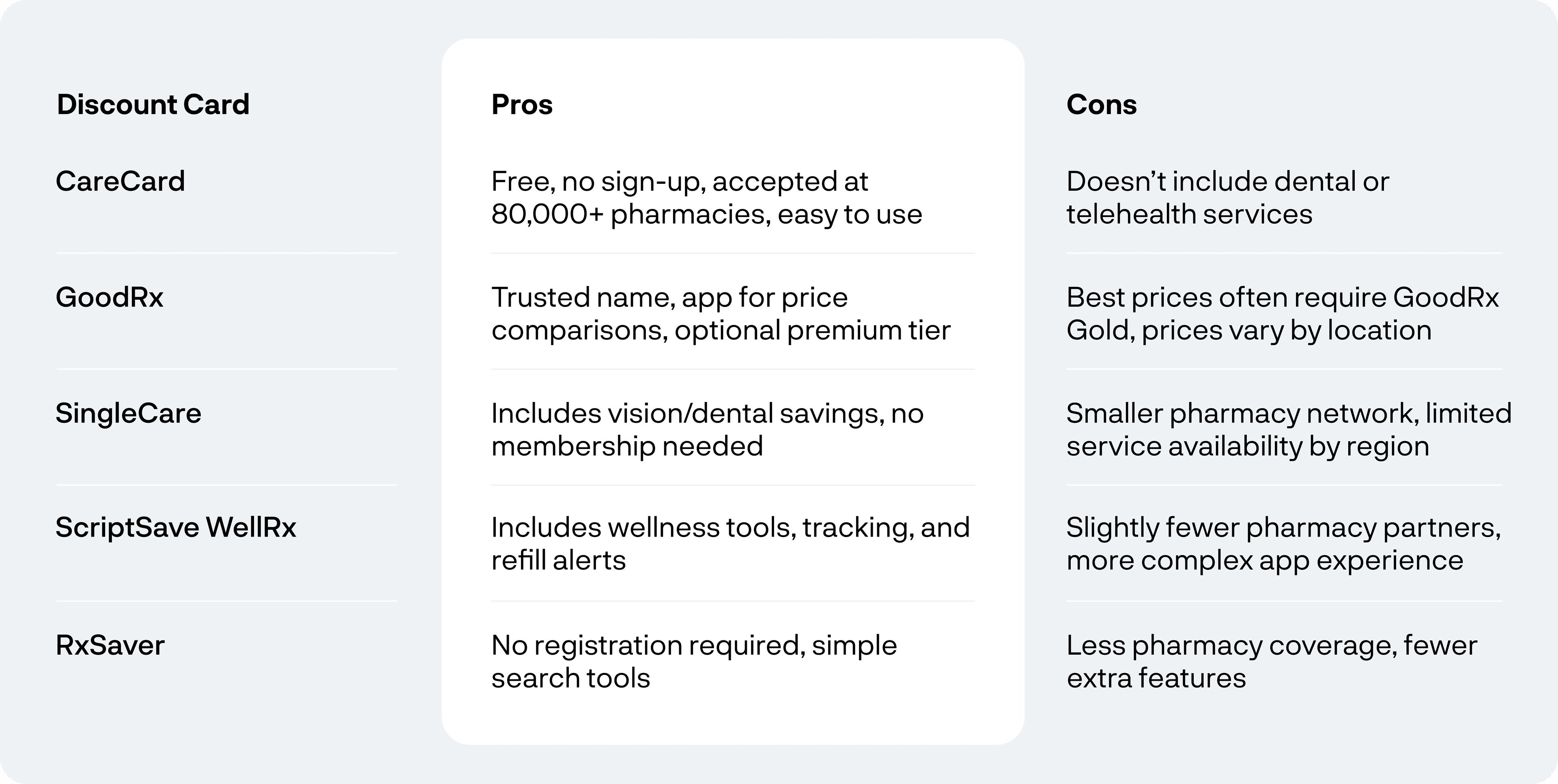Aug 28, 2025
Top Prescription Discount Cards to Help You Save in 2025

THIS WEBSITE DOES NOT PROVIDE MEDICAL ADVICE The content included on this website is for informational and educational purposes only. Always consult with your healthcare provider regarding any medical condition and before starting any healthcare or medication regimen.
Introduction
Prescription drug costs can be a major burden—especially for those without insurance or with high out-of-pocket expenses. Fortunately, prescription discount cards can offer an easy, accessible way to save money on medications.
In this article, we’ll explore the best prescription discount options in 2025, comparing how they work, what makes them unique, and where they’re accepted. Whether you’re managing a chronic condition or just want to lower your monthly expenses, a CareCard prescription discount card is one of the simplest ways to save.
What Are Prescription Discount Cards?
Prescription discount cards give you access to pre-negotiated, lower pricing on medications at participating pharmacies. They are not insurance, but they can be used with or without an insurance plan to find the best deal.
Most cards are free, require no commitment, and are easy to use—just show your card at the pharmacy counter and ask for the lowest available price.
Top Prescription Discount Options in 2025
CareCard
CareCard offers discounts on thousands of medications and is accepted at over 80,000 pharmacies nationwide. There are no fees, no sign-ups, and no insurance requirements—just instant savings at the counter.
Pros:
Completely free
No registration or personal info required
Accepted at major pharmacy chains and independents
Mobile-friendly with instant access
Largest network of affiliated pharmacies
Cons:
Does not offer dental, vision, or telehealth savings like some competitors
To use CareCard, show your printed or digital card at the pharmacy and ask for the best price available.
GoodRx
GoodRx is a widely recognized prescription discount platform with a searchable database of drug prices. To access deeper savings, a paid membership known as GoodRx Gold is required.
Pros:
Helpful website and app for comparing prices
Accepted at most major U.S. pharmacies
GoodRx Gold plan offers extra discounts
Cons:
The best pricing often requires a paid membership with a monthly recurring charge in addition to the cost of the medication.
Coupon prices may vary by pharmacy and location
SingleCare
SingleCare provides discounts on prescriptions and some healthcare services, including dental and vision, in certain areas. It’s free and doesn’t require insurance or a subscription.
Pros:
Includes discounts for dental, vision, and virtual care
Easy to access online or through the app
No fees or commitments
Cons:
Smaller pharmacy network than CareCard or GoodRx
Health service savings not available in all states
ScriptSave WellRx
ScriptSave WellRx emphasizes medication management alongside savings. Its app includes refill reminders, tracking tools, and drug interaction alerts.
Pros:
Offers refill reminders and medication tracking
Includes wellness-focused tools
Free to use
Cons:
Fewer pharmacy partners than competitors
The interface may feel complex for users just looking for quick savings
RxSaver
RxSaver is a no-frills prescription discount program that doesn’t require sign-up. It’s designed for quick price searches and printable or mobile coupons.
Pros:
No account or sign-up needed
Simple, intuitive website and app
Includes both generic and brand-name discounts
Cons:
Smaller pharmacy network than CareCard and GoodRx
Lacks additional services like tracking or telehealth tools
Why CareCard Remains a Top Choice
Each of these programs can offer valuable savings—but CareCard stands out for its ease, transparency, and wide acceptance. With no barriers to entry, a broad pharmacy network, and consistently competitive pricing, it’s a reliable go-to whether you’re insured, uninsured, or just looking to save.
Download your free CareCard prescription discount card today and start saving—no sign-up, no fees, and no insurance needed.
Top Prescription Discount Cards Comparison Table

Frequently Asked Questions
1. Are prescription discount cards legitimate? Yes. Prescription discount cards are legitimate programs that provide access to pre-negotiated medication pricing. Many are accepted at major retail pharmacies and can be used with or without insurance.
2. Can I use a discount card if I already have insurance? Absolutely. Most pharmacies will allow you to compare your insurance price with a discount card and choose the lower one. However, using a discount card instead of insurance means the purchase may not count toward your deductible.
3. Do I need to sign up for a discount card program? It depends on the provider. Some cards, like CareCard and RxSaver, do not require any sign-up. Others, like GoodRx Gold, offer premium tiers that require registration and a monthly fee.
4. Are there any hidden fees with these cards? Most programs—especially the free ones like CareCard, SingleCare, and RxSaver—have no hidden fees or charges. Always read the terms to ensure there’s no required subscription.
5. How much can I actually save? Savings vary widely depending on the medication, your location, and the pharmacy you visit. Some users save a few dollars, while others may save up to 85% off retail prices with the right card.
6. Which prescription discount card has the largest pharmacy network? CareCard is accepted at over 80,000 pharmacies, including CVS, Walgreens, Rite Aid, Walmart, and thousands of independents—making it one of the most widely accepted options.
7. Can I use multiple discount cards at the same time? You can compare multiple discount cards, but you can only use one per transaction. It’s a good idea to check pricing on a few platforms before filling your prescription.
